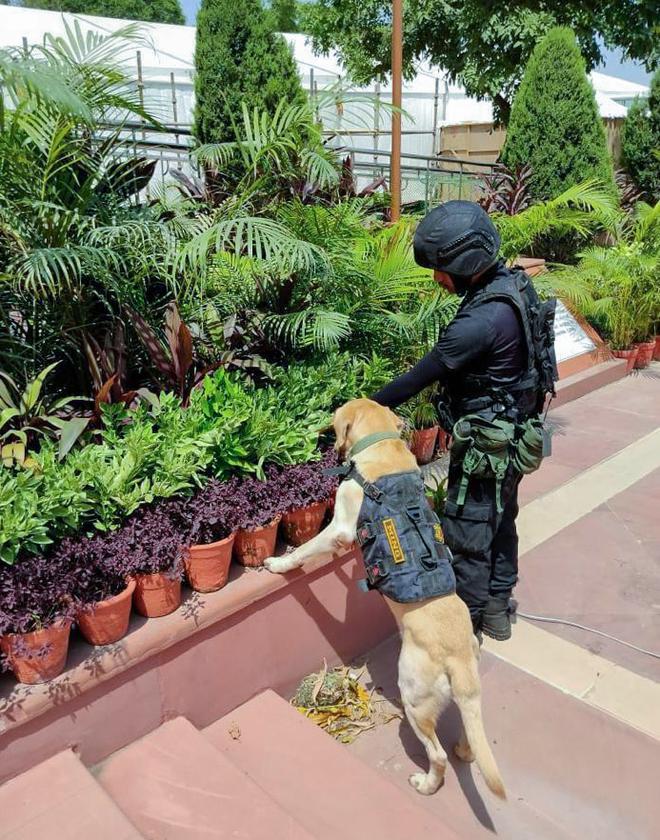As Sherpas of all G-20 countries arrived in New Delhi ahead of the final week of negotiations for the summit next weekend, India’s G-20 Sherpa said he was “confident” of consensus on economic issues.
Meanwhile, government sources sought to play down the impact that the absence of at least three leaders including Presidents of Russia, China and Mexico will have on the summit’s outcomes.
The Sherpas and Sous Sherpas, who are the chief negotiators for the G-20 leaders, will meet from September 3 to 6 on the outskirts of Delhi at a resort hotel near Manesar to decide on the content of the “joint communique” to be released at the end of the 18th G-20 summit in Delhi on September 9 and 10. Speaking about the intensive virtual discussions in the run-up to the final week, India’s G-20 Sherpa Amitabh Kant, who disclosed earlier that talks have taken place from “2 p.m. to 2 a.m.” for the past few weeks, said he was confident of forging joint statements on economic issues, indicating there’s still no breakthrough on the geopolitical issue over Ukraine.
“We will achieve consensus on all growth and development issues and on all our priorities. We are positive , constructive, ambitious and will be balanced. Our Declaration will speak the voice of the Global South from where most of the global growth will come from in the next two decades,” he told The Hindu on Saturday.
If they fail to come to a consensus, which has eluded G-20 ministerial meetings thus far, mainly over the paragraphs on Ukraine, they will turn the task over to the leaders, most of whom will arrive in India by September 8, with the three exceptions. While Russian President Vladimir Putin had directly conveyed his inability to attend the summit – owing to the conflict in Ukraine – to Prime Minister Narendra Modi in a telephone call last week, Mexican President Andres Obrador is sticking to practice, as he has not attended a single G-20 summit since he was elected, and has deputed his Economy Minister to attend in his place. Chinese President Xi Jinping has not publicly declared his intention to stay away from the summit, but hasn’t confirmed his attendance either and officials said it is “unlikely” that will come.
“In today’s world with so many demands on the leaders’ time, it is not always possible for every leader to attend every summit,” official sources said, on background, in a written response to media reports about the absence of some countries at the Heads of State/Heads of Government (HoS/HoG) levels.
“From time to time, many leaders skip summits for their own reason… These things do not reflect anything about the host country,” they added in the response, pointing out that at least six leaders did not attend the Rome G-20 summit in 2021.
In addition, the government response highlighted that the Kingdom of Saudi Arabia has not attended 9 of the 17 G20 summits thus far at an HoS/HoG level. Crown Prince and Prime Minister Mohammad Bin Salman is however expected to attend the summit in Delhi, after which he will be hosted for a State visit by Prime Minister Narendra Modi on September 11.

Meanwhile, the chief task ahead of the Sherpa and Finance track teams over the next few days will be forging the joint statement, or leaders declaration, which every G-20 summit thus far has been able to issue. Diplomatic sources said negotiations over the past two months have hit roadblocks on other issues besides Ukraine, such as the figures in “billions” or “trillions” on climate financing to be contributed by developed countries. Russia, China and Saudi Arabia have opposed the imposition of “carbon emission peaking” deadlines by the G-7 countries. There are differences between developed countries and the developing countries over the language on increasing representation of the Global South on the boards of international financial institutions like the World Bank. The sources said that the G-7 had also opposed language on condemning the disrespect or destruction of religious texts or sacred books. And as The Hindu has reported, China objected to many of the Indian additions on millets, Lifestyle for Environment (LiFE) and the use of the Sanskrit phrase Vasudhaiva Kutumbakam.
“While the hosts had been hopeful of concluding all non-geopolitical (non-Ukraine) paragraphs during the inter-sessional meetings, it now seems, many trade-offs are still required and all the language may not be agreed upon before the summit,” said a diplomat privy to the consultations, who indicated that the most positive development is that the induction of the African Union (AU) as proposed by India is through.
Apart from the attendance, the government is also grappling with the question of a “family photo”– with many leaders unwilling to pose together for a formal photograph during the summit, given the divide over Ukraine. However, the government will ensure informal photographs, showing the leaders interacting at Raj Ghat on September 10 morning when they pay respects to Mahatma Gandhi at his memorial in Delhi.







